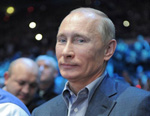 Wall Street Journal: Now that Vladimir Putin has allowed the Russian electorate to rubber-stamp him back into power, he can return with redoubled purpose to his consistently regressive interference in world affairs.
Wall Street Journal: Now that Vladimir Putin has allowed the Russian electorate to rubber-stamp him back into power, he can return with redoubled purpose to his consistently regressive interference in world affairs.
The Wall Street Journal
By MELIK KAYLAN
 Now that Vladimir Putin has allowed the Russian electorate to rubber-stamp him back into power, he can return with redoubled purpose to his consistently regressive interference in world affairs. That nobody is surprised at his obdurate defense of the regimes in Tehran and Damascus speaks volumes. Dictators support dictators, don’t they?
Now that Vladimir Putin has allowed the Russian electorate to rubber-stamp him back into power, he can return with redoubled purpose to his consistently regressive interference in world affairs. That nobody is surprised at his obdurate defense of the regimes in Tehran and Damascus speaks volumes. Dictators support dictators, don’t they?
At this point Mr. Putin apparently doesn’t mind much that anyone should include him in that category. After all, if Putinism could be defined by any single principle, if it had a formula, it would have at its core the “power now people later” approach common to all strongmen. Less than 10 years before he ordered the 2008 invasion of Georgia in order to “protect” the separatist South Ossetians, he “solved” the Chechnya problem by ordering the scorched-earth obliteration of its capital, Grozny, where more civilians were killed than at Sreberniza and Homs combined.
And yet one shouldn’t suspect Mr. Putin of sentimentality. He doesn’t favor dictators for mere principle’s sake. Iron-hard strategic calculations underpin his support for the Syria-Iran axis.
Russia is rebuilding its Soviet-era naval base in the Syrian port of Tartus, which allows Moscow to reassert a plausible Mediterranean threat to NATO. Syria also provides Iran with a front line against Israel via Hezbollah in Lebanon, and that too can be a most effective anti-Western arrowhead for Russia. When I covered the Russian invasion of Georgia in 2008, I learned that a year earlier Israel had stopped providing Tbilisi with antitank and anti-aircraft missiles because the Russians had threatened to supply Hezbollah with the same.
But in the end, the pivotal consideration in Mr. Putin’s efforts to re-establish his country’s superpower status centers on Iran. Syria is a domino. Without its Syrian ally, Iran would be almost totally isolated and crucially weakened. That Moscow cannot allow.
Why is Iran so central to Mr. Putin’s global pretensions? Take a look at the Caspian Sea area map and the strategic equations come into relief. Iran acts as a southern bottleneck to the geography of Central Asia. It could offer the West access to the region’s resources that would bypass Russia. If Iran reverted to pro-Western alignment, the huge reserves of oil and gas landlocked in Kazakhstan and Turkmenistan and the like could flow directly out to the world without a veto from Moscow.
According to an Oct. 16, 2008, Wall Street Journal report, Turkmenistan is “one of the world’s hydrocarbon provinces” with enough natural gas to supply Europe’s annual needs three times over. Similarly, Kazakhstan’s Tengiz oil field is considered one of the world’s largest. As things stand, these countries depend on Russian pipelines for their national income.
At stake here is not merely the liberation of a vast landmass from the Kremlin’s yoke. The damage to Russian leverage would amount to a seismic shift in the global balance of power equal to the collapse of the Warsaw Pact.
Russia’s gas and oil leverage over Turkey, Ukraine and much of Europe would evaporate. The Silk Road countries would finally reclaim their history since it was diverted forcibly toward Moscow in the 19th century. Their nominal post-Soviet independence would become a reality. Perhaps most irksome for Mr. Putin and his kind, large swaths of the non-Russian zone would prosper disproportionately in comparison to neighboring Russian Federation provinces.
After some 12 years in the Kremlin, Mr. Putin has failed to deliver prosperity and a hopeful future to much of his population. In return for their sacrifice, he has fed them inflated dreams of empire and superpower nostalgia which he has deliberately identified with his own judoka personality cult.
This is not a scenario in which free peoples voluntarily choose their destinies and alliances. They bow to what’s good for them as determined by a kind of paternal supreme power.
If the mystique of Russian hegemony were to deflate, if formerly subject colonies suddenly rose to stability and affluence—as is happening in Georgia—Mr. Putin’s threadbare illusionism would fall apart entirely. He would never recover from the triumph of freedom in Syria and Iran.


